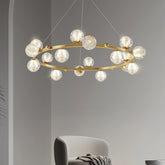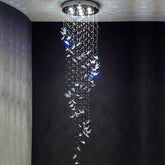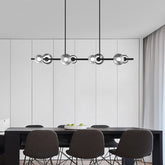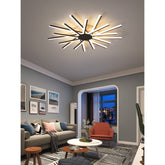The Psychology of Lighting: How Light Affects Mood and Productivity
Discover how light affects mood and productivity. Learn about the psychology of workplace lighting and its effects on your daily life.
Lighting plays a crucial role in our daily lives, affecting our visibility, mood, and productivity. Whether it's natural sunlight streaming through a window or the warm glow of a desk lamp, the type and quality of light can significantly impact how we feel and perform in various environments.
In this blog post, we will explore the psychology of lighting, delving into how different types of light can influence our emotions, energy levels, and overall well-being. Join us as we unravel the fascinating connection between light and human psychology.
The Importance of Natural Light
Natural light profoundly impacts our mood and well-being due to its uplifting qualities. The abundance of natural light has been shown to increase serotonin levels, which can enhance feelings of happiness and reduce symptoms of depression. Additionally, exposure to natural light helps regulate our circadian rhythm, improving sleep patterns and overall cognitive function.
Incorporating more natural light into our environments can enhance our overall well-being and create a more positive and energizing atmosphere.
Here's why:
1. Circadian Rhythm Synchronization:
Exposure to natural light is crucial to regulating our internal body clock by synchronizing our sleep-wake cycle and promoting a healthy circadian rhythm. Natural light helps signal our brain to stay awake during the day and encourages the release of melatonin, a hormone that aids sleep at night. This synchronization ensures better overall sleep quality and helps maintain a balanced circadian rhythm.
2. Enhanced Mood and Well-Being:
Sunlight triggers the release of serotonin, a neurotransmitter associated with happiness and well-being. Regular exposure to natural light can help combat mood disorders such as depression and seasonal affective disorder (SAD).
3. Increased Vitamin D Production:
Sunlight is crucial for our health as it is a primary source of vitamin D. This essential vitamin plays a vital role in maintaining strong bones, boosting the immune system, and promoting overall health. Regular exposure to sunlight allows our bodies to naturally produce vitamin D, benefiting our well-being in numerous ways.
4. Improved Cognitive Function:
Natural light has been proven to positively impact cognitive function, improving attention, alertness, and memory. This can significantly benefit productivity and focus, particularly in work and educational settings, where individuals can harness the power of natural light to enhance their performance.
5. Stress Reduction:
Exposure to natural light has numerous benefits for the body and mind. It not only has a calming effect, reducing stress levels and promoting relaxation, but it also creates a soothing environment that enhances overall well-being. Incorporating natural light into our daily routines can significantly improve our quality of life.
6. Increased Productivity:
Employees who work in well-lit environments are more productive and demonstrate better task performance. Additionally, they experience reduced fatigue and eyestrain. These findings from various studies highlight the importance of providing adequate lighting in the workplace to enhance employee well-being and overall performance.
7. Positive Impact on Physical Health:
Natural light has numerous physical health benefits. It has been found to promote faster healing, enhance immune system functioning, and alleviate symptoms of certain medical conditions. Exposure to natural light can positively impact overall well-being and contribute to a healthier lifestyle.
8. Connection to Nature:
Exposure to natural light not only brightens our surroundings but also allows us to connect with the outdoors. This connection fosters a sense of tranquility and appreciation for the natural world, reminding us of its beauty and importance in our lives.
The Role of Artificial Lighting
While natural light is ideal, artificial lighting also significantly influences our mood and productivity. Here's how:
1. Color Temperature:
Different light sources emit light at varying color temperatures, measured in Kelvin (K). Warm-colored light (lower Kelvin) can create a cozy, relaxing atmosphere, while cool-colored light (higher Kelvin) can promote alertness and focus.
2. Task Lighting:
Proper task lighting is essential for activities that require concentration and visual precision, such as reading, writing, or working on a computer. Well-designed task lighting can reduce eye strain and improve focus.
3. Light Intensity:
The brightness of artificial lighting directly impacts our energy levels and overall mood. Bright light has been shown to increase alertness and can help us feel more awake and focused. On the other hand, dimmer lighting creates a more relaxed ambiance, promoting a sense of calm and tranquility.
4. Lighting Design:
Combining various light sources and levels, thoughtful lighting design can create a dynamic and visually appealing environment. Different lighting techniques, such as uplighting, downlighting, and accent lighting, can enhance the overall aesthetic and ambiance.
5. Emotional Impact of Lighting:
Different lighting conditions can evoke various emotional impacts of lighting in individuals. Warm, dim lighting can create a cozy and intimate atmosphere, perfect for relaxation and comfort. On the other hand, bright and excellent lighting can promote energy and excitement, making it ideal for lively and vibrant settings. The power of lighting should not be underestimated, as it can influence our moods and emotions in unique ways.
6. Light and Sleep Quality:
Exposure to bright, blue-rich light in the evening, especially from electronic devices, can disrupt our sleep patterns by suppressing the production of melatonin, a hormone that regulates sleep.
7. Light and Creativity:
Lighting can influence our creativity and inspiration. Soft, warm lighting can create a comfortable, safe space that encourages thinking and brainstorming, while brighter, cooler lighting can promote focus and analytical thinking.
8. Sustainable Lighting:
LED bulbs are an environmentally friendly lighting solution that reduces energy consumption, making them beneficial for the planet and creating a healthier and better overall environment.
Lighting significantly affects mood, productivity, and well-being
Lighting profoundly impacts our mood, productivity, and overall well-being. By understanding how light affects mood and the psychology of lighting, we can make informed choices about the type and quality of light we expose ourselves to in different environments.
Whether maximizing natural light exposure, optimizing artificial lighting design, or balancing color temperature and intensity, we can create spaces that support our emotional and cognitive needs. So, let's harness the power of light to enhance our lives, improve our productivity, and create spaces that inspire and uplift us.
Remember, the proper workplace lighting can make all the difference. Illuminate your world wisely.
































































































































